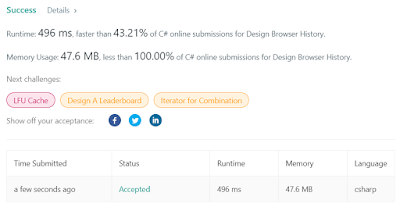Design Browser History in O(1)-time
Here is a design problem, from LC: https://leetcode.com/problems/design-browser-history/
You have a browser of one tab where you start on the homepage and you can visit another url, get back in the history number of steps or move forward in the history number of steps.
Implement the BrowserHistory class:
BrowserHistory(string homepage)Initializes the object with thehomepageof the browser.void visit(string url)visitsurlfrom the current page. It clears up all the forward history.string back(int steps)Movestepsback in history. If you can only returnxsteps in the history andsteps > x, you will return onlyxsteps. Return the currenturlafter moving back in history at moststeps.string forward(int steps)Movestepsforward in history. If you can only forwardxsteps in the history andsteps > x, you will forward onlyxsteps. Return the currenturlafter forwarding in history at moststeps.
Example:
Input: ["BrowserHistory","visit","visit","visit","back","back","forward","visit","forward","back","back"] [["leetcode.com"],["google.com"],["facebook.com"],["youtube.com"],[1],[1],[1],["linkedin.com"],[2],[2],[7]] Output: [null,null,null,null,"facebook.com","google.com","facebook.com",null,"linkedin.com","google.com","leetcode.com"] Explanation: BrowserHistory browserHistory = new BrowserHistory("leetcode.com"); browserHistory.visit("google.com"); // You are in "leetcode.com". Visit "google.com" browserHistory.visit("facebook.com"); // You are in "google.com". Visit "facebook.com" browserHistory.visit("youtube.com"); // You are in "facebook.com". Visit "youtube.com" browserHistory.back(1); // You are in "youtube.com", move back to "facebook.com" return "facebook.com" browserHistory.back(1); // You are in "facebook.com", move back to "google.com" return "google.com" browserHistory.forward(1); // You are in "google.com", move forward to "facebook.com" return "facebook.com" browserHistory.visit("linkedin.com"); // You are in "facebook.com". Visit "linkedin.com" browserHistory.forward(2); // You are in "linkedin.com", you cannot move forward any steps. browserHistory.back(2); // You are in "linkedin.com", move back two steps to "facebook.com" then to "google.com". return "google.com" browserHistory.back(7); // You are in "google.com", you can move back only one step to "leetcode.com". return "leetcode.com"
Constraints:
1 <= homepage.length <= 201 <= url.length <= 201 <= steps <= 100homepageandurlconsist of '.' or lower case English letters.- At most
5000calls will be made tovisit,back, andforward.
There is a way to design it with in O(1)-time (no for-loops required at all):
a) Looking at the limits imposed, you can allocate an array of strings up to 5k long. Allocate a little more than that so that you can go forward freely without checking for out-of-bounds
b) Keep track of the "max index", used for forwards
c) Use Max/Min functions when navigating back/forth. Rest of the code is trivial
Below, cheers, ACC.
public class BrowserHistory
{
private string[] history = null;
private int currentIndex = 0;
private int maxIndex = 0;
public BrowserHistory(string homepage)
{
history = new string[5500];
currentIndex = 0;
history[currentIndex] = homepage;
maxIndex = currentIndex;
}
public void Visit(string url)
{
currentIndex++;
history[currentIndex] = url;
maxIndex = currentIndex;
}
public string Back(int steps)
{
currentIndex = Math.Max(0, currentIndex - steps);
return history[currentIndex];
}
public string Forward(int steps)
{
currentIndex = Math.Min(maxIndex, currentIndex + steps);
return history[currentIndex];
}
}




Comments
Post a Comment